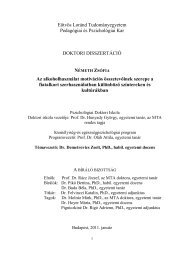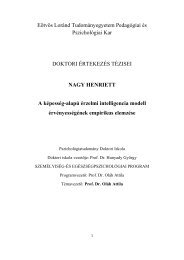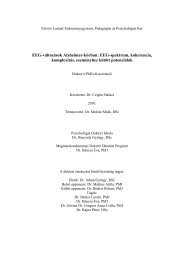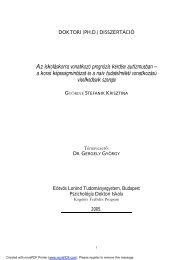- Page 1 and 2:
University of Eötvös Lorand Hunga
- Page 3 and 4:
DEDICATION TO MY PARENTS; YOUR HARD
- Page 5 and 6:
ABSTRACT A great deal of research h
- Page 7 and 8:
3. METHOD……………………
- Page 9 and 10:
1. INTRODUCTION 1.1. PURPOSE OF THE
- Page 11 and 12:
1981). This questionnaire was and i
- Page 13 and 14:
oncology wards (Sherman, 2004). Esc
- Page 15 and 16:
(SWB). The meaning of SWB is how pe
- Page 17 and 18:
extent demographic variables, work-
- Page 19 and 20:
2. LITERATURE REVIEW 2.1. THE THEOR
- Page 21 and 22:
different countries in Europe and t
- Page 23 and 24: Foxall, Zimmerman, Standley & Benee
- Page 25 and 26: nurse were both negatively connecte
- Page 27 and 28: elated to stress levels and job sat
- Page 29 and 30: Altun (2002) has pointed out that b
- Page 31 and 32: Demerouti et al. (2005) is also arg
- Page 33 and 34: Halbesleben & Buckley (2004) argued
- Page 35 and 36: Brewer & Shapard (2004) conducted a
- Page 37 and 38: the third dimension of the burnout
- Page 39 and 40: Table 1. Amount of nurses being bur
- Page 41 and 42: environmental variables at the hosp
- Page 43 and 44: and stress levels could be differen
- Page 45 and 46: about a patient’s treatment witho
- Page 47 and 48: Potter (2006) conducted a literatur
- Page 49 and 50: Lin, Hsu, Chao, Luh, Hung et al. (2
- Page 51 and 52: at work are underprivileged in comp
- Page 53 and 54: instructions from their supervisors
- Page 55 and 56: number of years worked as a nurse w
- Page 57 and 58: psychosomatic health, after demogra
- Page 59 and 60: environment, and support from the s
- Page 61 and 62: urnout. The factor which has been h
- Page 63 and 64: Diener & Tov (2005, in Kitayama & C
- Page 65 and 66: form of for example life satisfacti
- Page 67 and 68: develop burnout (see for example La
- Page 69 and 70: Simoni & Paterson (1997) have also
- Page 71 and 72: the psychological immune system (Ol
- Page 73: positive effect of social support i
- Page 77 and 78: support especially important in rel
- Page 79 and 80: (1999), Tummers et al. (2002), and
- Page 81 and 82: According to Maslach (1982), when i
- Page 83 and 84: 2.11. HOW CAN WE PREVENT BURNOUT? 2
- Page 85 and 86: work-related safety in order to dec
- Page 87 and 88: in the organization are not easy to
- Page 89 and 90: at work, and on the nurses’ work-
- Page 91 and 92: 3. METHOD 3.1 STUDY POPULATION The
- Page 93 and 94: the head nurse at the second meetin
- Page 95 and 96: • Satisfaction with Life scale (D
- Page 97 and 98: assess people’s satisfaction with
- Page 99 and 100: positive accomplishment in the nurs
- Page 101 and 102: Goal Orientation 0.63 0.52 Impulse
- Page 103 and 104: 23,71% Number of children 0-1 2-3 4
- Page 105 and 106: It was shown that the Swedish nurse
- Page 107 and 108: APPENDIX 3); a robust Welch-test fo
- Page 109 and 110: Table 8: ANOVA results of work stre
- Page 111 and 112: In the second part of the second hy
- Page 113 and 114: would be found in the Swedish sampl
- Page 115 and 116: The Monitoring-Creating-Executing S
- Page 117 and 118: 4.6.3. Findings for Burnout and Per
- Page 119 and 120: Table 17: Robust Test of Equality o
- Page 121 and 122: Approach-Belief System (r=0.260, p
- Page 123 and 124: p
- Page 125 and 126:
Approach-Belief System (1.01) and t
- Page 127 and 128:
Marital status Table 23: Burnout me
- Page 129 and 130:
generalized to other hospitals in S
- Page 131 and 132:
feeling inexperienced would result
- Page 133 and 134:
sample. Another researcher who foun
- Page 135 and 136:
5.3. BURNOUT AND LIFE SATISFACTION
- Page 137 and 138:
the findings in connection to life
- Page 139 and 140:
salaries of health care system pers
- Page 141 and 142:
urnout simply shows that the area o
- Page 143 and 144:
feel supported at home and feel the
- Page 145 and 146:
and that lower personality scores g
- Page 147 and 148:
connection between age and burnout.
- Page 149 and 150:
connection to them was not thought
- Page 151 and 152:
and young nurses working in the int
- Page 153 and 154:
extensively researched all around t
- Page 155 and 156:
what if the Hungarian nurses would
- Page 157 and 158:
immunity between different countrie
- Page 159 and 160:
care workers (usually nurses). In s
- Page 161 and 162:
more efficient if they would be dir
- Page 163 and 164:
Aries, M. & Ritter, I. Z. (1999). N
- Page 165 and 166:
Brooks I. & Swailes S. (2002). Anal
- Page 167 and 168:
Chang, E. M., Bidewell, J. W., Hunt
- Page 169 and 170:
Cronin-Stubbs, D. & Rooks, C. A. (1
- Page 171 and 172:
Diener, E., Suh, E., Lucas, R. E. &
- Page 173 and 174:
Ghorpade, J., Lackritz, J. & Singh,
- Page 175 and 176:
Hupcey, J. E. (1998). Clarifying th
- Page 177 and 178:
Lakin, B., Leon, S. C. & Miller, S.
- Page 179 and 180:
Leiter, M. P. (1993). In Halbeslebe
- Page 181 and 182:
Maslach, C. (1982). Burnout: a soci
- Page 183 and 184:
Murrells, T., Robinson, S. & Griffi
- Page 185 and 186:
Piko, B. F. (1999). Work-related st
- Page 187 and 188:
Sherman, D. W. (2004). Nurses’ St
- Page 189 and 190:
Taris, T. W., Schreurs, P. J. G. &
- Page 191 and 192:
Wright, T. A. & Cropanzano, R. (199
- Page 193 and 194:
a. Age…………..years old b. Wh
- Page 195 and 196:
6.I do not particularly like differ
- Page 197 and 198:
4) I am interested in how you feel
- Page 199 and 200:
APPENDIX C ORIGINAL SPSS OUTPUTS Se
- Page 201 and 202:
Cases Reliability Scale: ALPHA Case
- Page 203 and 204:
Cases Case Processing Summary N % V
- Page 205 and 206:
RELIABILITY /VARIABLES=pici7 pici23
- Page 207 and 208:
Cases Case Processing Summary N % V
- Page 209 and 210:
Reliability Statistics Cronbach's A
- Page 211 and 212:
Section 6: Correlations of the test
- Page 213 and 214:
Emotional exhaustion_ mbi Depersona
- Page 215 and 216:
Table 11: Robust Tests of Equality
- Page 217 and 218:
ience d Worklo ad Stress related to
- Page 219 and 220:
Table 17: Coefficients(a) Unstandar
- Page 221 and 222:
Table 23: Excluded Variables(b) Par
- Page 223 and 224:
Table 30: Test of Homogeneity of Va
- Page 225 and 226:
a Predictors in the Model: (Constan
- Page 227 and 228:
5 6 country 4,870 ,772 ,342 6,305 ,
- Page 229 and 230:
Social support questionnaire ,145(b
- Page 231 and 232:
Being unprepaired and feeling inexp
- Page 233 and 234:
Social mobilizing capac. subscale_P
- Page 235 and 236:
Section 16: Correlations of the PIC
- Page 237 and 238:
Table 48: Correlations: (Group numb
- Page 239 and 240:
Positive thinking subscale_PIC I Se
- Page 241 and 242:
Positive thinking subscale_PICI Sen
- Page 243 and 244:
Approach-Belief System Monitoring-C
- Page 245 and 246:
Approach-Belief System Monitoring-
- Page 247 and 248:
Model 1 Variables Entered Work stre
- Page 249 and 250:
Change and Challenge orient. subsca
- Page 251 and 252:
Married -,160(c) -2,798 ,006 -,208
- Page 253 and 254:
Relationship with the patient’s r
- Page 255 and 256:
More than 5 years worked as a nurse
- Page 257 and 258:
Work and private life ,006(b) ,079
- Page 259 and 260:
Social creation capac. subscale_PIC
- Page 261 and 262:
6 7 Residual 6334,172 172 36,827 To
- Page 263 and 264:
Self-Efficacy subscale_PICI ,109(a)
- Page 265 and 266:
Significant other subscale_ social
- Page 267 and 268:
Stress related to tasks -,109(d) -1
- Page 269 and 270:
7 Age Relationship with patients Wo
- Page 271 and 272:
Estimate S.E. C.R. P Label Burnout
- Page 273 and 274:
country ss ws ls PIC Burnout PIC ,0
- Page 275 and 276:
Table 106: ECVI Model ECVI LO 90 HI
- Page 277 and 278:
coun try 2,41 8 dp -,723 ss ls PICI
- Page 279 and 280:
Table 120: tandardized Indirect Eff
- Page 281 and 282:
ment_mbi Emotional exhaustion_mbi D
- Page 283 and 284:
Personal accomplishment _mbi single
- Page 285 and 286:
2 Model 1 2 Married . a Dependent V
- Page 287 and 288:
Number of years at the current work
- Page 289 and 290:
edu Total How many years have you w
- Page 291 and 292:
Table 160: Chi-Square Tests Value d
- Page 293 and 294:
Death, dying Conflic ts with doctor
- Page 295 and 296:
Death, dying Conflic ts with doctor
- Page 297 and 298:
** Correlation is significant at th
- Page 299 and 300:
Estimate S.E. C.R. P Label e12 2,40
- Page 301 and 302:
APPMONSYS CREEXSYS SELFREGSYS Goal
- Page 303 and 304:
Table 184: RMSEA Model RMSEA LO 90
- Page 305 and 306:
Table 192: Correlations: (Group num
- Page 307 and 308:
APPMONSYS CREEXSYS SELFREGSYS Self-
- Page 309:
Table 204: NCP Model NCP LO 90 HI 9







